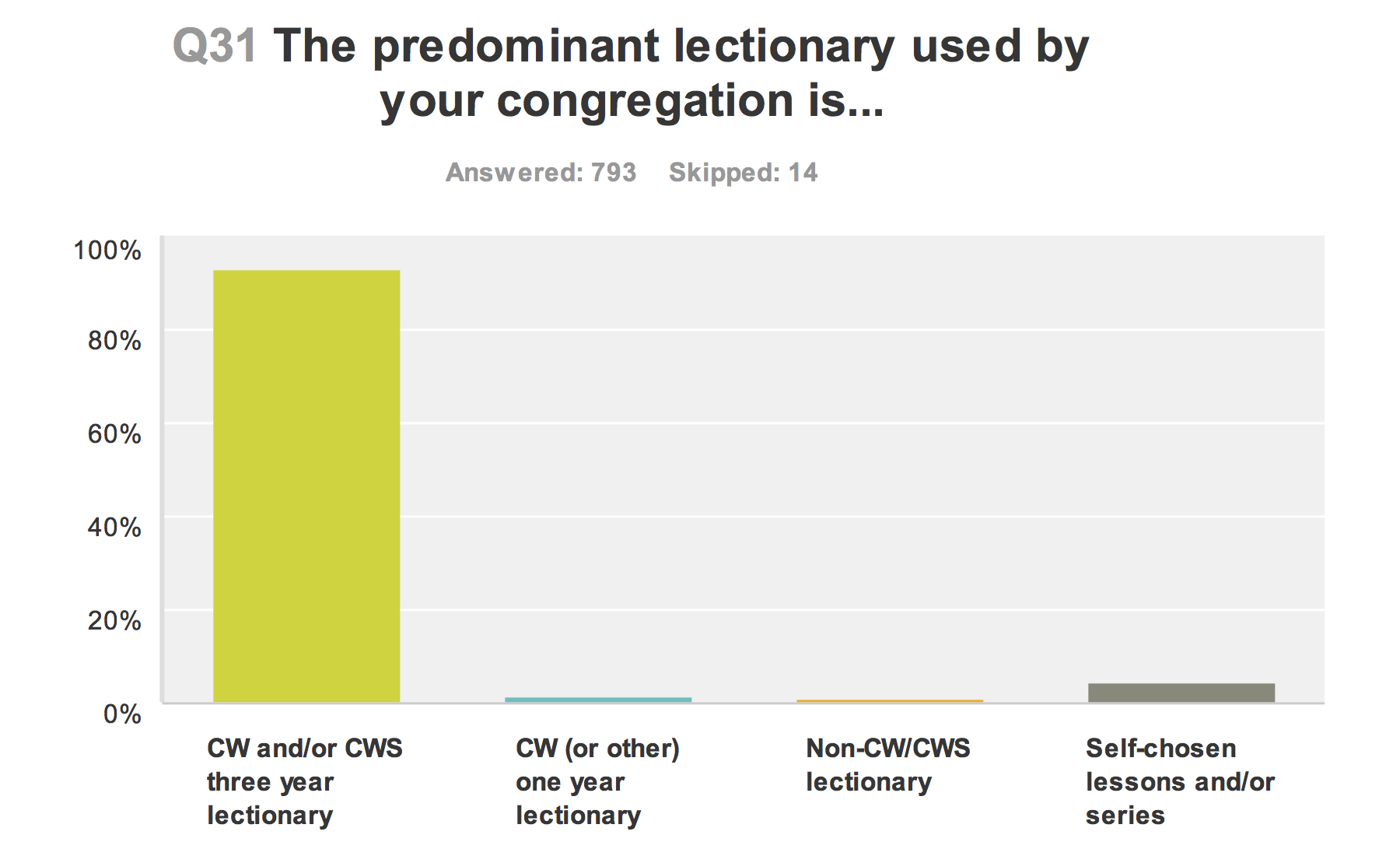Apr 6, 2014 by Jonathan Micheel
A few questions on the recent survey to pastors dealt with rites. Included in the “rites” category are Sunday services, devotions, prayers, and services for special occasions (confirmation, weddings, funerals, and many others).
First, let me say thanks again to all the pastors who took time to fill out the recent survey. All of us on the Rites Committee serve as parish pastors, and we realize that time is in short supply. We’re grateful to you for sharing your thoughts. Please allow me to offer a few comments in light of what you wrote.
You’re using what’s in the books.
While there are some pastors who craft their own rites for special occasions or for Sunday services, most pastors in our synod, it seems, often use what’s already there. A very high percentage of you reported that you often utilize the rites and prayers in Christian Worship, in Christian Worship Altar Book (CWAB), Christian Worship Occasional Services (CWOS) and Christian Worship Pastor’s Companion (CWPC). You likely modify these rites based on circumstances, but you often turn to them.
This leads me to conclude two things. First, few, if any, are suggesting that we throw everything out and start from scratch. Should we make updates and modifications? Yes, but we shouldn’t throw out the baby with the bathwater when it comes to our hymnal resources. Second, whatever is in the books had better be good! Since many pastors turn to these resources often, we need to ensure that what you’re turning to is of high quality.
You’d like more options.
Many of you offered suggestions for additional rites, prayers and service settings. Some examples, along with some thoughts in response to what you wrote:
- Prayer of the Church. For this longer prayer, some would like more options that reflect, if only briefly, thoughts in the Scripture lessons for the day. Many make use of the LC-MS “Let Us Pray” resources, as well as prayers by authors in our synod. Could we add more Prayer of the Church options for variety’s sake? Even options for specific, non-festival Sundays?
- The Prayer of the Day (traditionally called the “collect”). These historic prayers, many of which have been used for well over a millenium, are appreciated because of their concise, expressive language and deep roots. Nevertheless, you would like alternatives, especially some that connect more closely with the Scripture lessons of the day.
- Festival services. Many would like to see more service settings for festivals and commemorations throughout the year, like Ascension, Christmas Eve (something besides Lessons and Carols), Reformation, Pentecost, Thanksgiving and others. I could see a digital compendium being an ideal place for such services; imagine a website where special services were regularly posted. Fresh ones could be added every few years. However, I wonder about including many such services in a print edition. Take a special Reformation order of service, for instance. Would it be widely used for a couple years, but then be considered “old hat” after that? The number of special festival service settings and in what format they’ll be offered--we’ll need to think more about that, but we realize it is something many pastors would value.
- Service settings for main Sunday services. Quite a few mentioned using service settings by David Haas and Marty Haugen. Fresh musical settings are definitely something we’re looking into. These settings should be relatively easy to learn, accessible to people with varying levels of musical training (even no training at all), and generally singable. And they should “wear well,” being useful for many years. That’s a tall order, but we consider it a very important part of our work.
- Service elements. Not only would you like new options for whole services, but also for parts of the service. An example would be alternate forms for confession and absolution -- some even hearkened back to the confessional service in The Lutheran Hymnal. We could note that CWOS has Corporate Confession, but perhaps you’re saying that you’d like more such options in the main hymnal for easy reference and regular use. Alternate forms for other portions of the service would be appreciated, too.
- Options for other services. Many would like more options for midweek services, such as those in Advent and Lent. The current Evening Prayer (Vespers) and Prayer at the Close of Day (Compline) services can work well, but a few more options would be appreciated. Likewise for chapel services: the current devotions in CW and the newer ones in CWS are certainly useful, but more sound alternatives would be used, too.
One thing to remember is that there will always be a need for pastors to adapt and even compose services and prayers. As many rites as we may add, the unique needs of every congregation and mission field will require rites-related work. But the hymnal project will aim to help pastors in that work.
Finally, I’d encourage pastors to take another look at the current Christian Worship resources. Did you know that in CW Altar Book there’s a Prayer of the Church for Good Shepherd Sunday? (It’s at the very end of a section.) Did you know there’s an alternate funeral service in CW Occasional Services? That there’s a rite in the same book for receiving new members, either by transfer or by adult confirmation? That in CW Pastor’s Companion there are prayer suggestions for congregational meetings? Many pastors do know about these resources, but, based on survey responses, some do not. I’d encourage all pastors to glance at the table of contents in these books. Order them for your congregation if you don’t have them; they will be used often in the next decade before new resources are released.
Thanks again, pastors, for your responses. Please continue to share your thoughts. May the Lord bless your labor!

